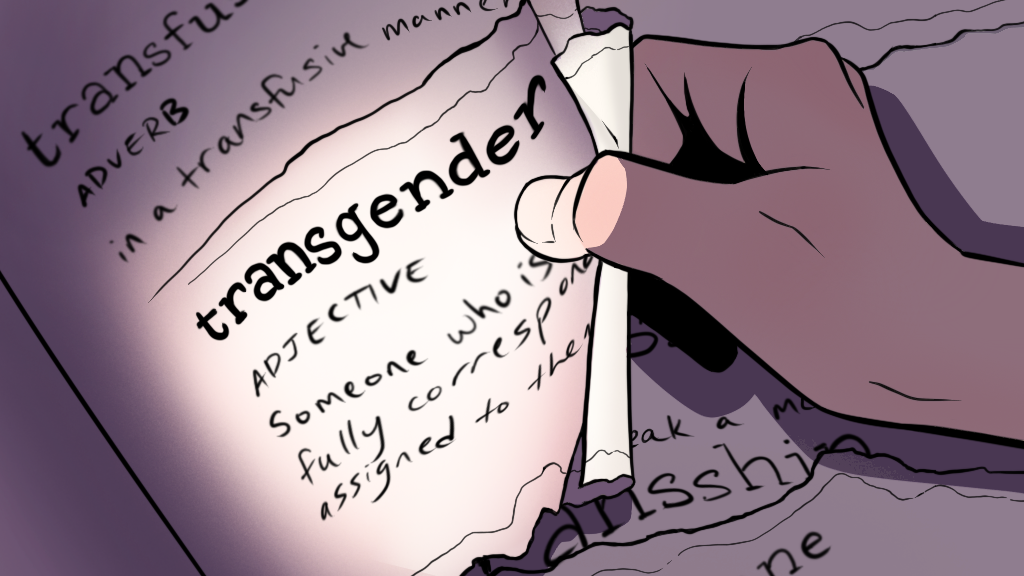The Past Injustice of the Trump Administration
by Karina Le | published Dec. 3rd, 2021
Even with the inauguration of President Biden on Jan. 20, 2021, it's integral to talk about the previous injustices under the Trump administration against transgender people.
On Oct. 21, 2018, the New York Times released an article with a memo from the Department of Health and Human Services which discussed re-examining the definition of transgender. This action ignited the discussion of whether or not this meant the total erasure of the transgender community.
Under the administration of Donald Trump, other infringements have occurred with transgender-based rights. Various laws and policies throughout the states have attacked the trans community, such as the bathroom bills or the allowance for businesses to discriminate against people of the LGBTQ community. It begs the question: what does it mean for a government to be for the people when they cultivate laws to oppress its people?
Policies, Laws and Court Rulings, Oh My!
The aforementioned policy would incite a complete rewrite of the transgender definition.
“The Trump administration [considered] narrowly defining gender as a biological, immutable condition determined by genitalia at birth,” a New York Times article reported.
However, gender itself is not something inherent to our biology. Gender is an extremely personal experience, and many people can and will have a complicated relationship with it. Especially for the transgender community, individuals who do not identify with the sex they were assigned to at birth.
Not only could this cause a total erasure of the transgender community, but it could displace and put in danger thousands of transgender Americans. With Trump's proposal, the transgender community is denied the respect they deserve in terms of being recognized by their gender identity.
The injustices the Trump Administration has committed against the transgender community did not stop at this policy. Since Donald Trump's election, there have been several laws and cases that infringed on the rights of trans individuals — specifically on a state level.
An example can be seen in the July 2020 bill allowing single-sex homeless shelters to refuse transgender individuals.
Throughout Trump's time in office, there was a battle of checks and balances between the presidential office to the Supreme Court and the House and Senate. For example, in opposition to the exclusion of transgender individuals, the Supreme Court ruled on June 15, 2020, to extend the civil rights law in workplace discrimination to gay and transgender workers.
Yet at the same time, when the military ban was first announced by President Donald Trump around July 2017, it was additionally backed by the Supreme Court.
"The court, without comment, granted a request from the Justice Department to allow the government to enforce the ban," NBC Newsreported.
However, despite the Supreme Court ruling in a 5-4 majority, the implementation of the policy has been halted by some judges of lower federal courts who disagreed with this reason and this policy as a whole, as examined by the previously mentioned NBC article.
"There is absolutely no support for the claim that the ongoing service of transgender people would have any negative effect on the military at all ... there is considerable evidence that it is the discharge and banning of such individuals that would have such effects," Judge Colleen Kollar-Kotelly of a Washington, D.C. court explained.
As reported by Stars and Stripes, Judge George Russell of the US District Court for the District of Maryland is blocking the policy by refusing to lift his injunction that he issued in Nov. 2019. An injunction is basically an order issued from a court body that forces the party, whether it be a person or the government itself, to prevent a specific action. In this case, Russel is using his injunction to prevent the policy from being implemented as of Feb. 2, 2019.
Whether or not the injunction will continue to prevent the policy is still up in the air, but nonetheless shows how support from officials can go in stopping discriminatory policies.
Lasting Effects
Most of the policies that have come from the Trump administration, from one's that have passed on a state level to policies passed on a national level, discrimination against transgender individuals was at an all-time high. The issue of hate crime, including violence against transgender people, has been rising throughout the years.
Of course, even with these kinds of discriminatory policies going about, the people still have the power to fight against it.
RIT Message Center sent out an email in mid-Nov. 2018 titled, "Supporting the transgender community: A message from President Munson," that explicitly stated RIT's opposition to removing trans rights from their Title IX policy.
One of the powers the population has on our government is our voice. It's in our votes that we have some sort of control over what and who we want to represent us as a populace. From a national level to a state level, we can pick and choose our representatives from all forms of government.
Even if you are an individual who is not a part of the community, it is essential to understand the state-level interest in these areas. It is not just the community, but the allies of it, that can make sure what happened during the Trump Administration does not happen again.
We have to educate ourselves about who we're voting for, past the political parties. We have to focus more on their policies and what kind of person you're voting for. Focus on the individual, because it is in the individual's beliefs that will shape an entire state's — and even country's — state of affairs.



